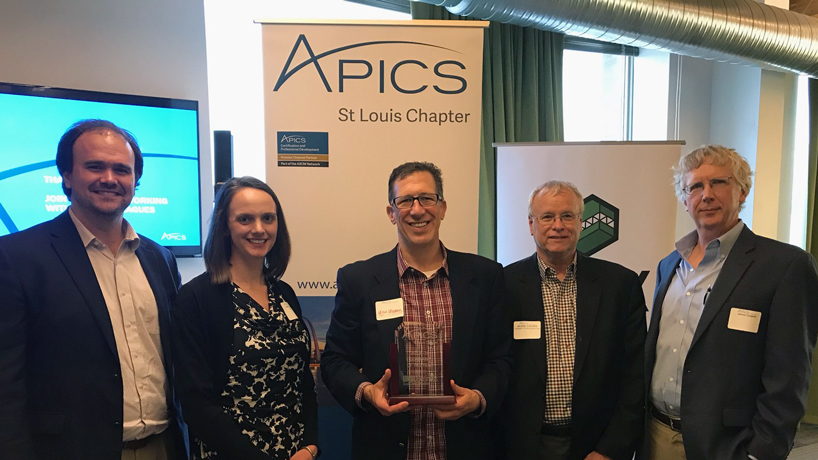
Supply chain faculty (from left) Matias Enz, Andrea Hupman Cadenbach, Mitch Millstein, Mike Edwards and James Campbell accept the 2018-19 Company of the Year Award from APICS St. Louis on May 9. (Photo courtesy of the Department of Supply Chain and Analytics)
APICS St. Louis has named the University of Missouri–St. Louis its 2018-19 Company of the Year.
UMSL’s Department of Supply Chain and Analytics has supported the local professional supply chain management organization in a number of ways recently. Faculty members Mike Edwards and Mitch Millstein participated in the APICS professional development program with presentations on supply chain finance and omnichannel distribution, respectively. The university also hosted the regional Convergence Conference in March, which was a one-day event focused on mitigating change and mastering collaboration within operations and supply chain management.
Millstein, Edwards and their colleagues Matias Enz, Andrea Hupman Cadenbach and James Campbell accepted the award at an APICS event May 9.
“This APICS award is a reflection of our growing prominence,” said Campbell, who serves as the supply chain and analytics department chair. “The community recognizes that we are a center of excellence for Missouri and beyond.”
APICS St. Louis was established in 1959 and has grown into one of the largest and most active chapters in the country. The organization provides supply chain certification, training and networking opportunities.
UMSL’s participation in APICS activities is part of a larger effort to build community partnerships and connect students to local businesses.
“As a public research institution in an urban area, we need to serve the industry,” Campbell said. “Part of that mission is generating the talent that the region needs. Most of our students stay here, so we partner with local professional organizations to help those groups be more effective and to connect students to all of these companies.”
UMSL has also developed ties to the APICS national organization, which is the global leader in supply chain certification programs, through a three-year, $130,000 grant for drone delivery research.
The project, led by Campbell and Associate Professor Haitao Li, focuses on delivering vaccines to underdeveloped areas of Vanuatu. The country of 80 islands stretched across more than 600 miles of the Pacific Ocean has many transportation challenges.
Preliminary research suggests that adding drones to certain parts of Vanuatu’s vaccine supply chain can be economical and reduce the time health-care providers spend picking up medical supplies.
“We hope to help save children’s lives using our supply chain skills,” Campbell said. “The grand vision is for a multimodal vaccine delivery system. They would use drones where it makes sense as well as trucks, boats and planes. There is no technological reason that drones can’t play a part.”














